We proudly serve Dayton, Cincinnati, and Columbus with a variety of commercial roofing services to protect your business. Whether your commercial roof has reached the end of its life or you need routine repairs, we are here to help.
As a leading commercial roofing company, we have the experience and expertise necessary to install all types of commercial roofing solutions. We stand behind all work performed by our contractors with a dedication to quality results.
Learn more about our commercial roofing services then CONTACT US for a FREE ESTIMATE.
WE EDUCATE, YOU DECIDE
Types of Commercial Roofing
Commercial roofing can be tricky. As they are quite a bit larger and require a true professional to handle in order to ensure there are no mistakes. At Roofer Ohio, you can rest assured your commercial roof will be in good hands with our experienced staff and superior equipment.
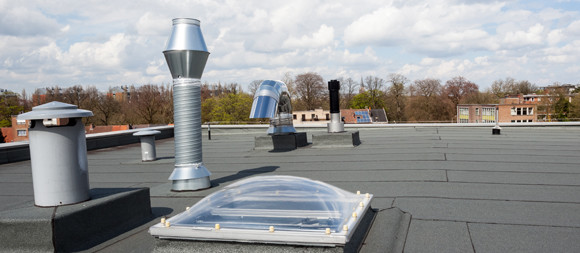
Single-Ply
Membrane
Single-ply is the most well-known and time-tested roofing solution for commercial buildings. There are also many types of single-ply membrane roofs to fit your needs and budget.
Our commercial roofing contractors install and repair all types of single-ply roofs with a goal of delivering high-quality and long-lasting solutions.
TPO
ROOFING
Thermoplastic polyolefin (TPO) is a single-ply membrane that is made of a single layer of synthetic materials.
TPO today accounts for nearly 40% of the commercial roofing market. TPO is popular because it combines the benefits of PVC and EPDM roofs but with a lower cost than PVC.
To create a TPO membrane, rubber, propylene, and ethylene are chemically bound along with fillers like fiberglass. This type of roof comes in many specifications and colors that include black, white, and light gray.
TPO roofs are prized for their durability. This type of roof resists debris and dirt build-up with the flexibility to resist tears, impact damage, and punctures. It can also adjust to building settling and movement. A TPO roof will resist damage from UV, chemical, and ozone exposure. Because it uses hot air-welded seams, it has seam strength that surpasses EPDM roofing.
A primary downside to TPO is it is fairly new. TPO has only been used since the 1990s which means manufacturers are still perfecting their formula. The long-term durability and lifespan of TPO are also uncertain.
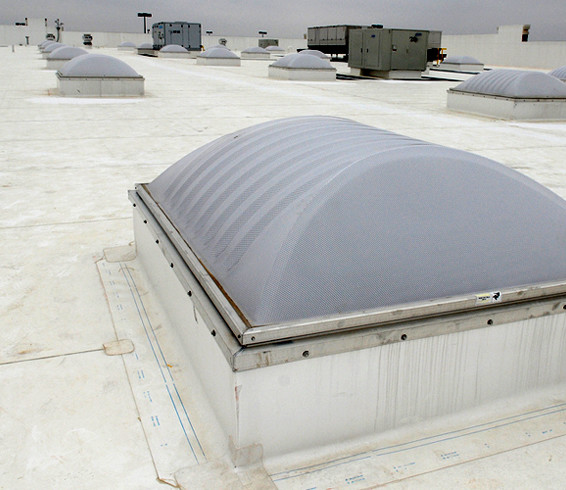
Do you have a TPO roof with damage or signs of aging? It’s important to repair damage as soon as possible to maintain the integrity of your roof. Common problems we repair include:
- Punctures. This can happen due to a severe storm with hail or a worker walking on your roof. Patching is an effective solution with very good long-term results.
- Ponding. While the seams are designed to create a water-tight seal, stress can weaken the welds. These seams can become entry points for water.
- Weathering. This can be caused by normal aging, a build-up of debris, and contaminants on the membrane.
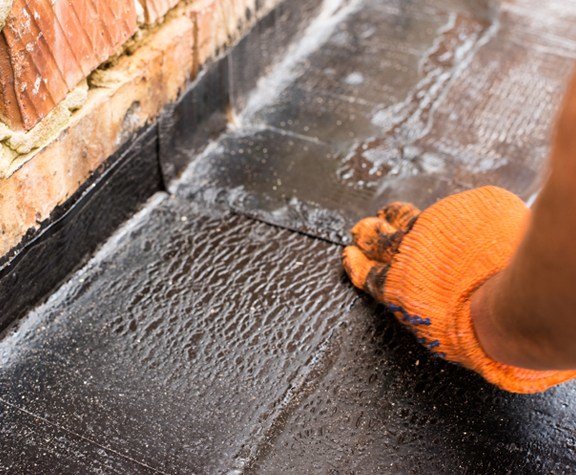
EPDM
Roofing
Ethylene propylene diene terpolymer (EPDM) or rubber roofing is an incredibly durable roofing option that has been a top choice for contractors for 40 years. EPDM is a time-tested roofing solution that offers excellent resistance to the elements, especially UV damage, wind, and abrasion.
One of the most important benefits of rubber roofing is it’s low lifecycle cost. While you may pay less upfront for commercial roofing installation of other systems, EPDM is easy to modify and repair. This means lower ongoing maintenance costs and less frequent replacement. Even once it has been exposed to harsh elements for years, an EPDM roof can be easily restored to its original strength. An EPDM roof should last for up to 30 years, but there are many that have been in service for more than 40 years.
When your rubber roof is showing wear, we can help. Do you have an existing EPDM roof that’s leaking or showing its age? We can restore your roof to stop leaks for years and reduce cooling costs. After careful preparation of the surface, we will apply a coating or sealant to correct tears, rips, and leaks. Other forms of rubber roof repair may include patches, flashing repair, and protective sealants.
PVC
Roofing
PVC roofing is a single ply membrane made from flexible but thick thermoplastic material. PVC is popular as it can fit almost any flat roof and offer excellent fire protection. Unfortunately, PVC roofs do not have the best weather resistance,
especially when it comes to heavy snow or rain. In very cold climates, a PVC roof can become brittle. Despite these drawbacks, PVC does have unique positive features. It will not become weak or absorb grease or oil. This has made it the preferred roofing membrane for restaurants and buildings with rooftop grease traps.
especially when it comes to heavy snow or rain. In very cold climates, a PVC roof can become brittle. Despite these drawbacks, PVC does have unique positive features. It will not become weak or absorb grease or oil. This has made it the preferred roofing membrane for restaurants and buildings with rooftop grease traps.
If you have a PVC roof, it should be inspected regularly to check for damage. Occasional repairs will be needed. Our PVC roofing experts repair all types of commercial roof problems:
- Seams that aren’t welded correctly
- A lack of adhesion
- Ponding
- Missing edge flashing
- Incorrectly installed flashing
- Improper drain pipe
- Incorrect drain assembly
- Incorrect repairs
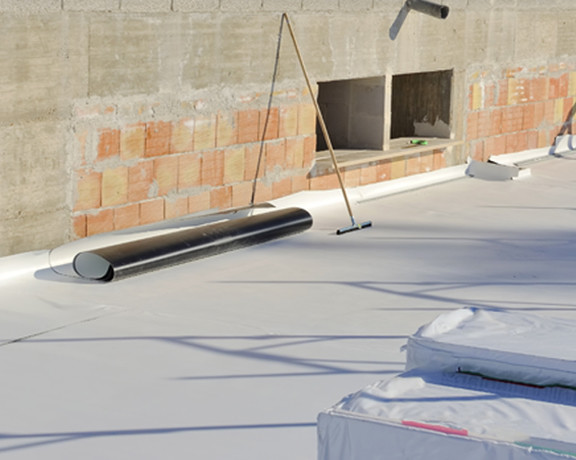
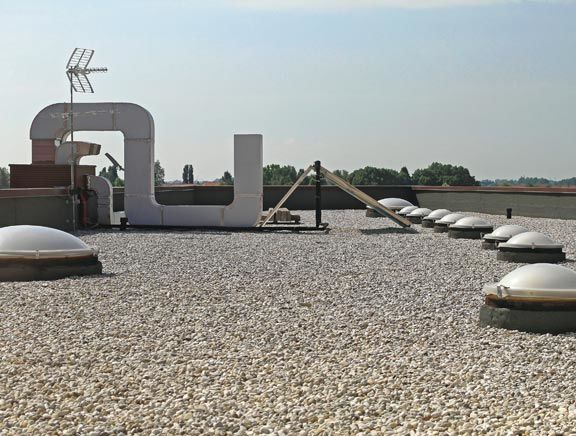
Built-Up
Roofing
Built-up roofing (BUR) or tar roofing is a common type of flat roofing system. Also known as a tar and gravel roof, BUR systems have been used for more than 100 years. As the name implies, this type of roof is made up of many layers of bitumen. The roof is installed by alternating layers of tar and fabrics on the roof.
The surface is finished with a coating or aggregate. Each layer or fabric in a built-up roof is called a ply sheet, which is usually reinforced with fiberglass. This is the standard BUR, but there are alternatives available today like a smooth asphalt built up a ballasted asphalt built up.
Built-up roofs have many advantages. This type of roof is very low maintenance and stands up well to weather conditions. It offers great waterproofing and UV protection with low maintenance costs. There are drawbacks to consider. BUR roofs have a higher installation cost than single-ply roofs and they are prone to water and wind damage.
METAL
Roofing
Commercial metal roofing is a great choice if you want a long-lasting and very low maintenance roof system. While metal roofing has a higher upfront cost than most options, it comes with many benefits. This energy-efficient roofing system isn’t just attractive; it can be your best defense against leaks, UV damage, and costly repairs. Metal roofing can be the ideal solution to minimize downtime during installation and improve the aesthetics of your facility. Just as with residential metal roofing, there are many products and colors to customize the look of your building.
There are many types of metal roofing available, most of which are made from steel. While metal tiles and shingles are most popular for homes, businesses often choose standing seam batten seam, and through fastened panels.
If your existing metal roof is damaged, you can count on our experts for reliable commercial roof repair. If your metal roof has developed leaks, it is likely the result of poor initial installation, punctures, or gaps. We also repair unsightly rust,
ponding, and blowoffs.
ponding, and blowoffs.
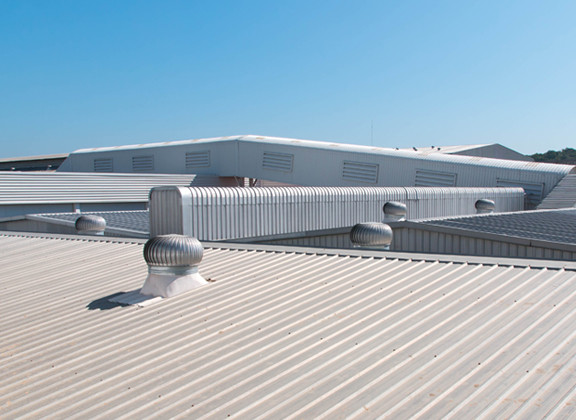
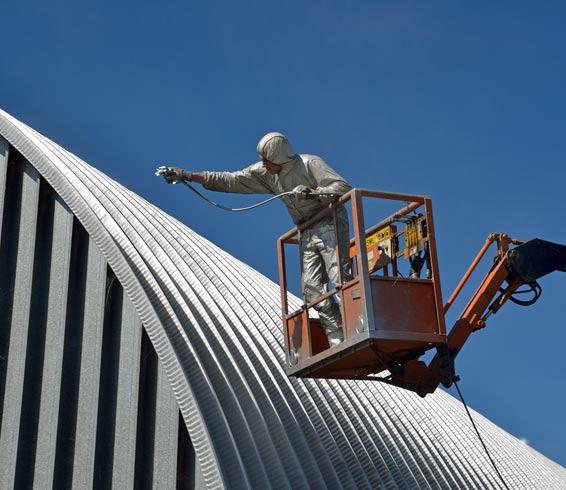
Commercial
Fluid Applied Roofing
A liquid or fluid applied roof can weatherproof your roofing system at a fraction of the cost of a complete replacement.
Your roof is a major component of your business. All it takes is a leaking roof to damage expensive business equipment or force your business to shut down for repairs. If your commercial roof has seen better days but it’s still functioning, a fluid applied roof membrane can be a cost-effective repair solution. A liquid or fluid applied roof can weatherproof your roofing system at a fraction of the cost of a complete replacement. We offer fluid applied roofing in Ohio to extend the life of your commercial roof by decades.
Fluid applied roofing offers many advantages over other forms of roof recovering. If your roof has issues with standing water, fluid applied roofing systems can be a wise investment. A liquid roof membrane creates a strong bond with excellent waterproofing. Small holes, tears, and other damage will be fully repaired to stop water leaks and damage. Once the liquid coating cures, it creates a rubber-like membrane that can stretch and return to its original shape.
There are many types of fluid applied roofing products available today. You can count on an experienced fluid applied roofing contractor to help you choose the system best for your existing roof and needs. We can even apply a reflective white coating. This type of fluid applied roof membrane reflects UV rays to lower your air conditioning costs. No matter which type of liquid applied membrane you decide upon, it will need to be spray applied using specialized equipment to cure properly.
Whether you have a built-up roof (BUR), EPDM roof, TPO roof, or another type of system, fluid applied roofing can be a valuable investment.
CONTACT US to learn more about how a liquid roof membrane can extend the life of your commercial roof.
Have questions about Commercial Roofing?Find Your Answer Below
Our goal is delivering the best possible roofing system for your facility. We understand commercial roofing can be a bit overwhelming with so many options on the market. That’s why we are always here to answer questions. Here are some of the most common questions we hear from customers, but please give us a call with more specific concerns.
Do I need a permit?
Whether or not a permit is required depends on your county and the extent of the work. A permit is not always necessary for commercial roof repair but it may be for installation. It’s common for cities to require a permit for any major repairs (aside from patching) as well as commercial roof installation, but not necessarily residential re-roofing.
Always know whether you need a permit for your project and ensure the commercial roofing contractors you hire do not skip this important step. Otherwise, you may face significant fees and hurdles.
How do I know which type of roof is right for my business?
As a leading commercial roofing company in Dayton, Cincinnati, and Columbus, Ohio, we have installed and repaired all types of commercial roofing systems. Our experts will help you explore your options and choose the right system based on energy costs, climate, budget, and your facility needs. We will also help you compare the many options you have, from built-up roofs and EPDM to sheet metal and TPO roofs.
How long does it take to install a new roof?
The time it will take to replace your commercial roof depends on many factors. Depending on the scope of the project, it may take several days to several weeks to install your roof. Some commercial roofing systems can be installed faster than others. The installation time can also be reduced if your existing roof is in good condition and does not need to be removed. A tear-off will be required if your building already has two roof layers or an unsafe roof. This will increase the installation time.
How long will my new roof last?
Every commercial roofing system has a different anticipated longevity rating. How long your roof lasts also depends on factors like installation quality and maintenance. Here are typical lifespans for the most common commercial roof systems:
- Metal: 30-45 years
- Built-up roof (BUR): 10-15 years
- Single-ply membrane TPO: 15-20 years
- Single-ply membrane EPDM: 20-40 years
- Spray polyurethane foam: 30-50 years


